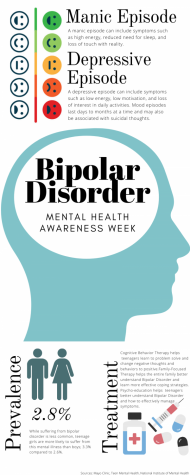Mental Illness Awareness Week
November 25, 2019
From October 6 through October 12 mental health awareness week began and ended. With 1 in 4 suffering from a mental illness, it has become more important for mental health to be discussed and for awareness topics, such as mental illnesses, to be advocated throughout the nation.

Senior Noah Summers is part of the estimated 2.8% of adolescents who suffer from bipolar disorder, according to the National Alliance on Mental Illness. While it is one of the least common mental illnesses, it has a great impact on Summer’s life.
“How is living with this mental illness affecting your everyday life?”
Summers has been suffering from bipolar disorder, or BP, since late September last year and finding ways to overcome it has been a long journey for him.
“It affects my mood which can prevent me from going places with my friends or even attending school,” Summers said. “Based off my mood determines how I deal with the day. If I suddenly become upset or angered I separate myself from everyone, so I don’t harass anybody. My disorder relies heavily on how I’m feeling, it’s important for me to adjust myself based off my emotions.”
Suffering from a bipolar disorder is not extremely common in teenagers, according to the National Alliance on Mental Illness. Last year, however, Summers was diagnosed with BP and since then he has become more aware of it and how to live a healthier life alongside it.
“I went for a checkup and talked to the doctor about what was happening,” Summers said. “He sent me to a psychiatrist for a while after that. I wasn’t sure at first that’s what I had but after investigation I saw the similarities.”
Just like with any mental illness there is a lot of stigma around BP and people who suffer from it. For Summers suffering from BP has brought many obstacles and barriers that he has had to overcome.
“My biggest obstacle is not letting it affect my life overall,” Summers said. “I don’t want it to rule my world. How people perceive me as well. I hope people don’t just assume I’m going to completely lash out. I want to be treated equal as others and not someone who may or may not immediately outburst into insanity.”
Bipolar disorder, like many mental illnesses, has no cure but is usually treated with medication and therapy such as Cognitive Behavior Therapy. While BP took Summers by surprise, he has now learned to thrive through even the toughest situations.
“It’s difficult to power through but once you do, every struggle after that becomes mediocre,” Summers said. “Now I take medication like antidepressants and mood stabilizers to help overcome my disorder.”
This October, it is important that the topic of mental illness isn’t shrugged off and that we strive to advocate for people with mental illnesses, such as Summers.

